Christopher Thomson Social Reformer and Artist. 1799 -1871
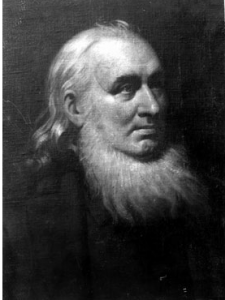 Christopher Thomson was born at Hull, on Christmas day, 1799. His father was a sailor. Christopher was educated at the Free School of Sculcoates, Hull. His father then opened a public House and Christopher was apprentice to a ship builder and he gladly attended evening school. His father subscribed to a circulating library for his son. At seventeen after watching ‘King John’ by Shakespeare, his sole desire was to act.
Christopher Thomson was born at Hull, on Christmas day, 1799. His father was a sailor. Christopher was educated at the Free School of Sculcoates, Hull. His father then opened a public House and Christopher was apprentice to a ship builder and he gladly attended evening school. His father subscribed to a circulating library for his son. At seventeen after watching ‘King John’ by Shakespeare, his sole desire was to act.
In 1821, he married Hannah Leaf and he worked for her father as a veneer sawyer but shortly afterwards they started a new life as strolling players. For extra money he started making trinkets and painting glass boxes. Life was hard and ten years later when his family arrived in Edwinstowe cold, hungry and penniless the villagers took them in and supported Christopher to become a house painter. In return, he endeavoured to improve life in the village.
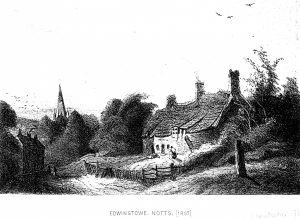
The home that Christopher and his family settled in and sketched by him in 1857.
 He and a group of likeminded people set up the library for the benefit of working men. On discovering that few could read he started night classes in 1838 in the Jug & Glass. The Edwinstowe Artisans Library and Mutual Instruction Society then started. Entrance was a penny and ran three nights a week. It was open to both men and women. An annual ball was held to raise funds and after 9 years they had 500 volumes of books.
He and a group of likeminded people set up the library for the benefit of working men. On discovering that few could read he started night classes in 1838 in the Jug & Glass. The Edwinstowe Artisans Library and Mutual Instruction Society then started. Entrance was a penny and ran three nights a week. It was open to both men and women. An annual ball was held to raise funds and after 9 years they had 500 volumes of books.
Education classes for reading, writing, arithmetic, music, drawing and conversation were free but members provided their own coal, candles and books. * See article below that C Thomson wrote in 1841.
A branch of the Odd-Fellows had been established in Edwinstowe and in 1833 Christopher joined it and became the secretary. He also started a self-help group where money was put aside for those who found times hard. (Sick-club)
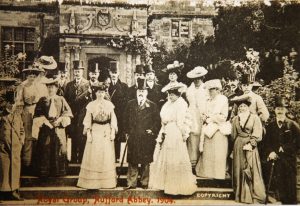 He was also employed at Rufford Abbey as interior painter-designer but later when work became sparse, he decided to move to Sheffield and to start a newsagent business. This failed but it gave him the opportunity to start working as a landscape artist at which he was extremely successful.
He was also employed at Rufford Abbey as interior painter-designer but later when work became sparse, he decided to move to Sheffield and to start a newsagent business. This failed but it gave him the opportunity to start working as a landscape artist at which he was extremely successful.
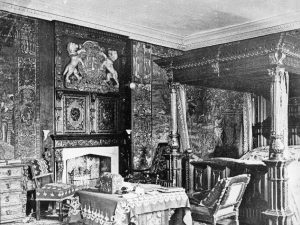
His art work can be seen in Sheffield Art Gallery.
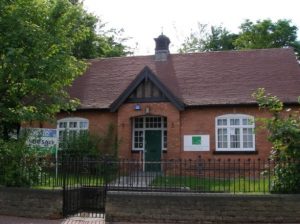 In later years, the Night Classes and Library moved to the ‘Old Library’ and followed in a similar tradition.
In later years, the Night Classes and Library moved to the ‘Old Library’ and followed in a similar tradition.


* THE J O U R N AL OF LITERATURE, SCIENCE, AND THE FINE ARTS. F OR T H E YEAR 1841.
But in preference to these, and as an evidence of the fruits of an enlightened spirit, in the very places where only outlaws and roisterers used to abide, we draw upon his ‘Gleanings from History’ for a letter, dated at the rural village of Edwinstowe, six miles through the depths of the forest:
“The history of an institution, founded on the very spot where our ancient kings signed the cross for lack of skill to write their names, will not be without interest to the general reader. I will therefore give it, verbatim, from a letter recently written by Mr. C. Thomson, a highly respectable painter, residing at Edwinstowe –“The history of our Library, though brief, may perhaps interest you a little. It was in 1836 that we began to feel anxious to establish one, and so drew up the outline of a plan, to be carried out in small shares, not exceeding five shillings each; but the idea of paying five shillings to buy books was thought visionary enough, and we were obliged to relinquish it. The matter rested here for twelve months, when, at the close of the summer of 1837, it struck me that if a few persons would unite, and begin the new year by paying one penny per week, taking periodicals to the amount subscribed, they would form the nucleus of a Library. I began at the Lodge, and got twenty names the first week: Mr. Trueman and Mr. Widdison joined with me, and we started the first Tuesday in January, 1838, and have now fifty members. We purpose forming a Music Class, on our next meeting, and to resume our readings and lectures— to be continued on the first Tuesday of every month until May. We have an annual meeting on New Year’s Eve, when a report of the year’s proceedings is read; addresses are delivered; and we have also a tea-party, open to all persons of character, whether members or not, on payment of ninepence—the surplus money going to the book-fund. The periodicals taken are–Chambers’ Journal, Athenaeum , Farmers Magazine, London’s Gardeners’ Magazine, Mechanics Magazine, Architectural Magazine, Polytechnic Journal, Tait’s Magazine, Penny Magazine, Visitor, Knight’s Pictorial, Shakespeare, Pictorial History of England and, in addition to these, the works of Cooper and Scott Biography-Travels, elementary works on Science, & co. We admit females as members, and likewise to the lectures; and the institution comprises men of all the trades in the neighbourhood, as well as farmers and agricultural labourers, many of whom reside at distances varying from two to six miles from the village. We have never applied for honorary members or donations, nor have we hitherto had any volunteered. Our rules are such as those which usually govern Mechanics’ Libraries, being copied from those of the Mansfield Institute with, however, this difference, that apprentices are permitted to read or take out books, simply on condition of their masters or parents being answerable for their punctual return, uninjured, and, to conciliate all parties, we except works on religious controversy and politics. An anxiety prevails amongst the members to build, by shares, a Library and Museum, with two dwelling-houses beneath to pay (with what may be gained by occasionally letting the large room for public purposes) the interest for the money invested; and I think this will be ultimately accomplished. The Odd Fellows’ Lodge was a wonderful improve on the old system of meeting to talk nonsense and quarrel over a frothing quart; and this is another, and greater. Under the operation of both together, we are not less mentally than socially improved. Formerly no place was more constantly or conspicuously figuring in the local police report than this; but now it is just the reverse, and its name is seldom seen there.’” If such letters as these be multiplied, times far better than those of the bull-ring and the bear-garden must await the people.
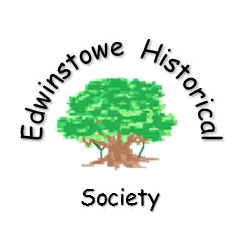 Edwinstowe Historical Society
Edwinstowe Historical Society